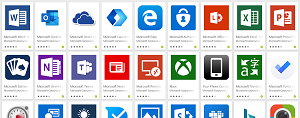News
Microsoft Engineers Detail Polyglot Approach to Android Development
- By David Ramel
- June 27, 2019
Ever wonder how Microsoft, which built its empire on the strength of its desktop apps, has specifically adjusted its development approaches in the new world of mobile, where it needs to duplicate those apps on platforms such as Android?
Well, Microsoft engineers are detailing their approach to Android development in a series of blog posts, with the first installment pointing to a decidedly independent, polyglot approach from different teams spread across the world.
The company in April announced the series of Android-related blog posts to shed light on the practices of Microsoft engineers, who account for more than 150 apps -- Outlook, Word, Skype and so on -- featured in the Google Play Store, with an average rating of 4.2 stars and some downloads measured in the hundreds of millions.
Earlier this month, the series -- involving input from engineers, designers, managers and others working on Android projects -- kicked off by answering many questions the teams receive in various ways.
"We want to give back to the community," says the post written by Cesar Valiente
of the Android@Microsoft team. "We want to cover specific Android related topics such as how a specific team works, the architecture a particular team follows, the infrastructure behind a specific app, and many others."
 [Click on image for larger view.] Some of the Microsoft Apps on Google Play (source: Microsoft).
[Click on image for larger view.] Some of the Microsoft Apps on Google Play (source: Microsoft).
One striking takeaway from the post is the independence of the Android teams, who, operating from 15 worldwide sites -- are free to choose how they work, covering everything from programming languages used to development methodologies and so on.
The choice of programming languages provides an example, with engineers using everything from Java to C++ to JavaScript (React Native) to C# (Xamarin).
Figuring prominently in that mix is Kotlin, the new programming language darling in many camps, currently experiencing -- as we just detailed -- meteoric growth.
"Kotlin is definitely a trend at Microsoft," Valiente said. "Many teams have already moved to Kotlin and all new code that they develop is written in Kotlin. Teams such as Sticky Notes embraced Kotlin even before Google announced its official support 2 years ago. Others like Microsoft To-do have embraced Kotlin later, writing all new code in Kotlin."
Here's a look at other options used by various teams:
- Architecture:
- Testing:
- Code, build and release management -- proprietary or FLOSS (Free/Libre and Open Source Software):
The post also covers: the company's embrace of FLOSS, using internal tools to confirm open source licenses and scan for intellectual property issues; authentication; team communication; and more.
Valiente promised more details to come in future blog posts.
About the Author
David Ramel is an editor and writer for Converge360.